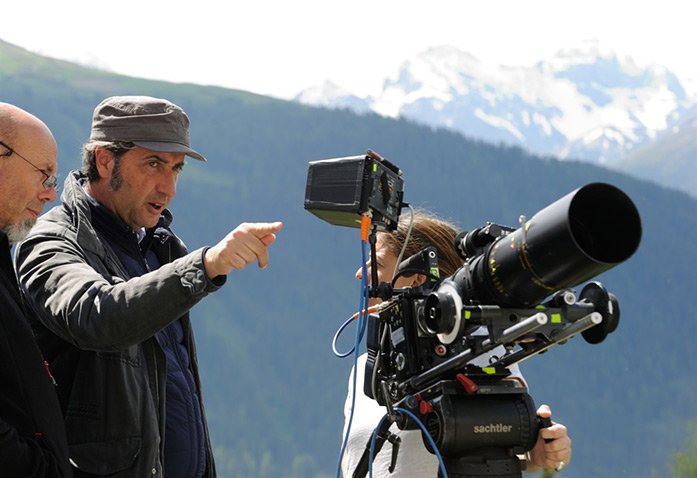 The word “grand” is bound to crop up when describing the films of Paolo Sorrentino. The director traffics in the type of grandeur that evokes Fellini, yet finds an alternate route, as well as the type that divides audiences immediately. Seven features in —including 2013’s Oscar-winning “The Great Beauty”— Sorrentino is deliberate with his choices, and so when speaking about his work, he uses the term freely to explain his style. It’s how he envisioned his latest film “Youth”, and also how he approached his upcoming HBO series,“The Young Pope”.
The word “grand” is bound to crop up when describing the films of Paolo Sorrentino. The director traffics in the type of grandeur that evokes Fellini, yet finds an alternate route, as well as the type that divides audiences immediately. Seven features in —including 2013’s Oscar-winning “The Great Beauty”— Sorrentino is deliberate with his choices, and so when speaking about his work, he uses the term freely to explain his style. It’s how he envisioned his latest film “Youth”, and also how he approached his upcoming HBO series,“The Young Pope”.
“I really wanted to do a series about the Vatican, and a series in grand style,” Sorrentino explained when the Playlist spoke to him recently in Los Angeles. “And in order to make the series in English, like I wanted, I had to have an English-speaking Pope. That’s how Jude Law’s character was born.”
That minor decision prompted an eight-part series due next year about an Italian-American Pius XIII portrayed by Law, alongside Diane Keaton playing a dramatic role that Sorrentino claims “we’ve never seen from her before, having done more comedy work.” Before that series, there’s “Youth,” another English-language project In which Michael Caine stars as Fred Ballinger, an acclaimed British composer preparing to retire and thus dodges repeated requests by the Queen to perform his most famous composition “Simple Songs.”

Set in and around the Swiss Alps at an upscale resort, Ballinger consorts with his best friend and Hollywood director Mick (Harvey Keitel), his daughter and assistant Lena (Rachel Weisz) and a famous film star (Paul Dano) preparing for his latest role. As with “The Great Beauty,” a sense of melancholy and lost time pervades the film and in Caine’s character, a quality that Sorrentino links to Caine’s personality itself.
“Michael may say that he’s very different from the character he’s playing, but I don’t really think so,” Sorrentino explained. “I think that both Michael and Fred are able to keep a distance from themselves and life. The right distance, that is.”

In addition to Keitel’s cinema-obsessed character, in which Sorrentino spoke about placing aspects of himself, the cast includes Jane Fonda as a mysterious actress and muse to Mick. As it turns out, Sorrentino wanted Fonda for a very specific reason.
“With someone like Jane Fonda,” he said, “I really wanted a true diva, and a true icon in real life. Throughout the movie, there’s this expectation that she’s coming to the resort, and when she arrived, it had to be consistent and coherent. So the entire cast was really the one I had in mind.”

One of the other consistently reliable aspects of Sorrentino’s films are their soundtracks, which flit from genre to genre and cohere into well-crafted sequences. “Youth” is no exception, featuring selections from Sun Kill Moon, Paloma Faith, Ratatat, Claude Debussy and many others. SKM’s Mark Kozelek and Paloma Faith even appear as themselves in the film, a fact reciprocated by Kozelek, whose song “Birds of Films” is about his time on the production.
Surprisingly, Sorrentino had no knowledge of Kozelek’s tune, but he did explain the reason for the musician’s role in the film. “Before I started to write ‘Youth,’ I was listening to a lot of Sun Kill Moon. [Kozelek’s] voice kept me lots of company, because I cannot write without listening to music. For this reason, I decided to put both him and his music inside the film…He was very happy to come and do it.” When asked which musician he’s favoring presently, the filmmaker mentioned “Andrew Bird. I’m really liking his music at the moment.”

Sorrentino’s films, from the biopic “Il Divo” to his road trip drama “This Must Be The Place,” all feature a unique and playful editing approach; it’s no question, Sorrentino said, that going into the cutting room is “the happiest moment” for him in the filmmaking process.
“The first time I start to edit a film, I’m great,” he says. “When I actually start to work is in the editing room. During production, I never go back and see what I filmed at the end of the day, so when I go to the cutting room, I really see for the first time what Luca [Bigazzi, his DP] and I captured.”
 So increasingly you can expect something noteworthy (or grand) from Sorrentino’s openings and end credits. “The Great Beauty” began with a party scene and ended with a peaceful regatta ride, while “Youth” starts and ends with two very different live performances. There’s also the fact in “Youth” that the main title doesn’t appear until nearly 20 minutes in. “Oh, that?” Sorrentino remarks. “That’s just a stupid fixation of mine, to see if I can ever get away with putting the title halfway through the movie.”
So increasingly you can expect something noteworthy (or grand) from Sorrentino’s openings and end credits. “The Great Beauty” began with a party scene and ended with a peaceful regatta ride, while “Youth” starts and ends with two very different live performances. There’s also the fact in “Youth” that the main title doesn’t appear until nearly 20 minutes in. “Oh, that?” Sorrentino remarks. “That’s just a stupid fixation of mine, to see if I can ever get away with putting the title halfway through the movie.”
“Youth” opens in theatres on December 4th.

